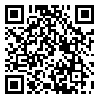Volume 11, Issue 4 (Autumn 2023)
PCP 2023, 11(4): 329-340 |
Back to browse issues page
Download citation:
BibTeX | RIS | EndNote | Medlars | ProCite | Reference Manager | RefWorks
Send citation to:



BibTeX | RIS | EndNote | Medlars | ProCite | Reference Manager | RefWorks
Send citation to:
Zohrabiy S, Abolghasemi A, Kafi Masoole M, Khosrojavid M. Comparing the Effectiveness of Emotion-focused Therapy and the Unified Trans-diagnostic Treatment on Fear of Negative and Positive Evaluation of Patients With Social Anxiety Disorder. PCP 2023; 11 (4) :329-340
URL: http://jpcp.uswr.ac.ir/article-1-896-en.html
URL: http://jpcp.uswr.ac.ir/article-1-896-en.html
1- Department of Psychology, Faculty of Literature and Human Sciences, University of Guilan, Rasht, Iran. , Shima.zohrabi@gmail.com
2- Department of Psychology, Faculty of Literature and Human Sciences, University of Guilan, Rasht, Iran.
2- Department of Psychology, Faculty of Literature and Human Sciences, University of Guilan, Rasht, Iran.
Abstract: (3430 Views)
Objective: Most of the research conducted so far on effective treatments for social anxiety disorder has used traditional cognitive-behavioral therapies. However, recent pathological theories emphasize the role of emotion regulation in the formation and continuation of the symptoms of this disorder. Thus, this study was conducted to compare the efficacy of emotion-focused therapy (EFT) and the unified trans-diagnostic treatment for individuals diagnosed with social anxiety disorder.
Methods: This was a quasi-experimental study with a pre-test-post-test control group design and a three-month follow-up. The statistical population of the study included all the people aged 18-40 years who were diagnosed with social anxiety disorder from September to March 2021 in Tehran City, Iran. A total of 21 patients were selected using purposive sampling and assigned to three groups (two experimental groups and one control group (7 patients in each group). The experimental groups 1 and 2 received EFT in twenty 120-minute sessions (one session every week) and the unified trans-diagnostic treatment in twelve 120-minute sessions (one session every week), respectively, while the control group did not receive therapy intervention during this period. The brief fear of negative evaluation scale (BFNE) and the fear of positive evaluation scale (FPES) were used to collect data. The repeated measures analysis of variance (ANOVA) was used to analyze the data in SPSS software, version 24. The significance level of the research was considered to be α=0.05.
Results: The results indicated that both EFT and trans-diagnostic treatment effectively reduced the fear of positive evaluation, but unified trans-diagnostic treatment had no significant impact on reducing the fear of negative evaluation in this group (P<0.05).
Conclusion: Accordingly, EFT and unified trans-diagnostic treatment were effective and practical methods to reduce the fear of positive and negative evaluation in this group. It is recommended that psychotherapists and counselors employ these approaches in practice.
Coresponding author: Shima Zohrabiy, E-mail: Shima.zohrabi@gmail.com
Methods: This was a quasi-experimental study with a pre-test-post-test control group design and a three-month follow-up. The statistical population of the study included all the people aged 18-40 years who were diagnosed with social anxiety disorder from September to March 2021 in Tehran City, Iran. A total of 21 patients were selected using purposive sampling and assigned to three groups (two experimental groups and one control group (7 patients in each group). The experimental groups 1 and 2 received EFT in twenty 120-minute sessions (one session every week) and the unified trans-diagnostic treatment in twelve 120-minute sessions (one session every week), respectively, while the control group did not receive therapy intervention during this period. The brief fear of negative evaluation scale (BFNE) and the fear of positive evaluation scale (FPES) were used to collect data. The repeated measures analysis of variance (ANOVA) was used to analyze the data in SPSS software, version 24. The significance level of the research was considered to be α=0.05.
Results: The results indicated that both EFT and trans-diagnostic treatment effectively reduced the fear of positive evaluation, but unified trans-diagnostic treatment had no significant impact on reducing the fear of negative evaluation in this group (P<0.05).
Conclusion: Accordingly, EFT and unified trans-diagnostic treatment were effective and practical methods to reduce the fear of positive and negative evaluation in this group. It is recommended that psychotherapists and counselors employ these approaches in practice.
Coresponding author: Shima Zohrabiy, E-mail: Shima.zohrabi@gmail.com
Keywords: Emotion-focused therapy, Unified trans-diagnostic treatment, Fear of negative and positive evaluation, Social anxiety disorder.
Type of Study: Original Research Article |
Subject:
Cognitive behavioral
Received: 2023/06/5 | Accepted: 2023/07/18 | Published: 2023/10/28
Received: 2023/06/5 | Accepted: 2023/07/18 | Published: 2023/10/28
| Rights and permissions | |
 |
This work is licensed under a Creative Commons Attribution-NonCommercial 4.0 International License. |








